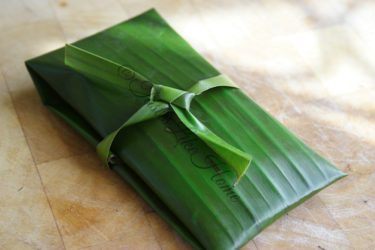Hi Everyone,
When was the last time that you had a real heart-to-heart conversation with your child, parent, relative, loved one, or a friend? I’m talking about the kind of communication that allows for long pauses, comfortable silence, eye contact, bent head or the gentle nudging of shoulders. The type of exchange that does not have an agenda of topics to cover, the only task to complete is the shelling of peas, peeling of katahar (breadnut), picking shrimp, making Conkies, Pastelles, Chinese cake or Black Pudding.

I am no psychologist, but speaking from my own personal experience, there are a number of factors at play.
If you have ever been involved in or observed the making of things like Black pudding, Conkies, Pastelles, or Chinese cakes then you know the amount of time they take to be made from start to finish. A pair of helping hands lighten the work.

Photo by Cynthia Nelson
I believe that the length of time the tasks take to be completed provides ample space for the ebb and flow of conversing about a variety of things – light and heavy, personal and not so personal. Memories are recalled and stories shared. I don’t know about you, but growing up I did not know a lot about my parents’ lives as children or teenagers.
Their stories always seemed to start only when they met or got married. I grew up in a time where you did not question your parents about anything, however, over many big bowls of fresh, firm, pink, white belly shrimp, I got glimpses into my mother’s life growing up on the East Coast of Demerara. We’d be sitting on the floor in the kitchen, quietly working from the same bowl, fingers quickly and rhythmically, removing the head and tail of each shrimp. She had her side of the bowl from which she was working and I had mine.
Sometimes when I’d see a nice big shrimp on her side of the bowl I’d cross the invisible border and pick the shrimp. It was in these moments, without prompting, that mommy would open up and talk about her siblings (those passed and those still with us), her deceased parents, and what life was like growing up in the country. I’d hear about how playful and serious they were, the strictness of my grandmother and the gentle nature of my grandfather. I’d sit there taking in these stories wishing at times that I could have met my relatives that passed. I wanted to ask questions but I was afraid that doing so would interrupt the flow and the free nature in which the stories were being shared. Whenever I’d come home from school and see that mommy had bought shrimp, I groaned with displeasure (to myself of course) and then I’d change out of my school uniform and sit opposite her to pick the shrimp.
I wanted to hear the stories but not pick shrimp! One day, out of the blue, she said, “I know you hate doing this.” By then I was a teenager so I plucked up some courage, stared at her bent head and responded, “So why you make me do it?”
She didn’t answer and it is only now that I am realizing how special that time together was; for her it was not so much about picking the shrimp, it was something we did together. It was a space that allowed mommy to reminisce about her family.

Photo by Cynthia Nelson
On another shrimp-picking occasion, in response to my fretting about the task at hand, she lectured me about she and her siblings having to do chores in the mornings and after school in the afternoons like cutting grass, feeding cows, yada yada yada. I wanted to let her know that dis time nah lang time but obviously I did not because that might have resulted in me swallowing some or all of my teeth! LOL.
Some tasks take longer than others and give you more time to pace yourself while talking. And some things take time to say. It is not easy opening up about painful things while wrapping up Conkies. Revealing bits about yourself as peas spill out of their pods and into the bowl almost seem metaphoric; you feel vulnerable, yet safe.
There are times when you don’t have to fill each passing moment with speech.
You don’t need to verbalize your thoughts. Comfortable in each other’s silence, you wrap the first piece of pastry dough around the black eye pea filling to make Chinese cakes and pass it on to your companion to be wrapped again in another piece of pastry dough. The close proximity within which you work forges an intimacy that is freeing in that you feel comfortable enough to speak about things that the rest of the household cannot hear.
Sitting side by side on a bench shelling peas makes it possible to gently nudge someone with your shoulder when they share about something from which they are still hurting. Or simply to bump shoulders and laugh in unison that you are so on the same page about whatever you are talking about.
Good or bad, light or heavy, intimate or not, really connecting and communicating is not easy. The distraction of doing something such as peeling away the layers surrounding katahar seeds as you let down your guard and open up is a most welcome diversion. Long pauses are never awkward because at the heart of this “meeting” is the activity in which you are engaged, so you can always “escape” as you gather your thoughts.
Today we have smart watches, smart phones, tablets, laptops and a gaggle of apps and software all in an effort to keep us connected and constantly in communication with each other. But are we really? It is a blessing and a comfort when you can open up a programme or an app on any of your devices and see the face and hear the voice of family, friends, and loved ones who are far away.
But what about those right next to us? Do we know what’s happening in their lives? When last did we do something together, just us, sans all electronic devices and gadgets?
Cynthia




